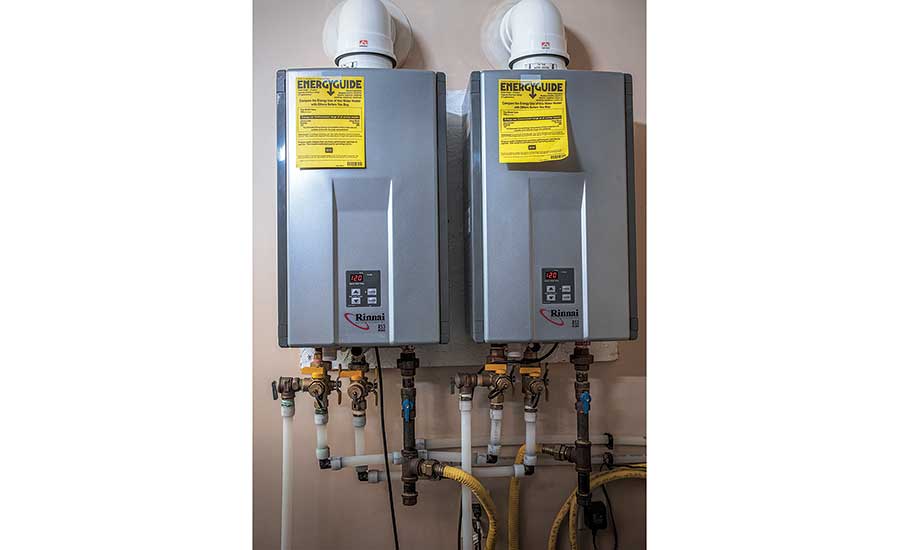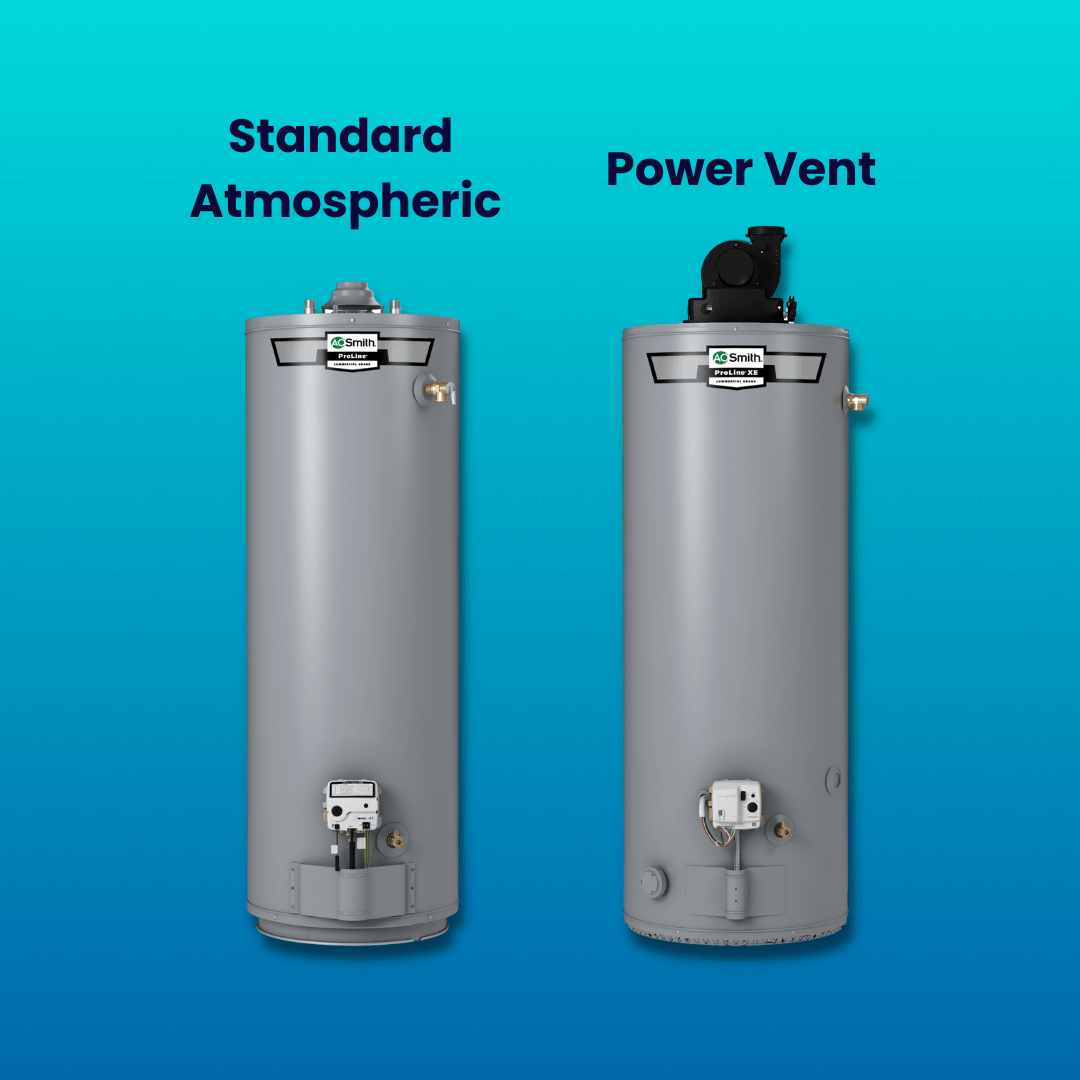A power vent water heater uses a fan to expel exhaust gases, while a tankless water heater heats water on demand. Both have distinct advantages based on energy efficiency and installation requirements.
Choosing between a power vent water heater and a tankless water heater depends on your specific needs and home setup. Power vent water heaters are ideal for homes where venting through a chimney isn’t possible. They are efficient but require electricity for the fan.
Tankless water heaters, on the other hand, provide hot water only when needed, reducing energy consumption. They save space and can offer endless hot water, but typically cost more upfront. Understanding these differences can help you make an informed decision on which system best suits your household’s requirements.
Page Contents
Power Vent Water Heater Basics
A power vent water heater uses a fan to push exhaust gases out. This helps in proper ventilation. The fan runs on electricity. It makes the heater work more efficiently. This type of heater can be placed anywhere in the house. The fan allows it to use longer vent pipes.
Power vent water heaters are energy-efficient. They reduce heat loss. These heaters are quieter than other types. They have a safety feature that shuts off the unit if there is a problem. Power vent heaters can be installed in smaller spaces. They are more versatile in placement compared to traditional heaters.
Tankless Water Heater Basics
Tankless water heaters provide endless hot water on demand, while power vent models use a fan to expel exhaust gases. Comparing efficiency, tankless units typically offer greater energy savings and space-saving benefits.
How It Works
A tankless water heater heats water only when needed. Water flows through the heater. The unit uses a powerful burner. This burner heats the water instantly. The heated water then flows to your faucet or shower. This system saves energy. No water is stored in a tank.
Key Features
Tankless water heaters are compact. They take up less space than traditional units. These heaters provide endless hot water. Energy efficiency is a big advantage. No standby heat loss occurs. Lifespan is longer than tank models. Maintenance is usually simple.
Performance Comparison
Comparing power vent water heaters and tankless units highlights efficiency and space-saving benefits. Power vent models offer faster heating, while tankless systems provide endless hot water and lower energy bills.
Heating Efficiency
Power vent water heaters heat water quickly. They maintain a steady temperature. Tankless heaters provide hot water on demand. They are more energy-efficient. They do not store hot water. Both types have their advantages. Choose based on your needs.
Flow Rate
Power vent water heaters have a limited flow rate. They rely on the tank capacity. Tankless heaters offer an endless supply of hot water. The flow rate depends on the unit size. Larger units provide more hot water. Smaller units may struggle with multiple outlets.

Credit: www.pmengineer.com
Installation And Maintenance
Power vent water heaters offer easier installation but require regular vent maintenance. Tankless models demand professional setup, yet need less ongoing care.
Ease Of Installation
Power vent water heaters need special venting. This venting can be expensive. These heaters need electricity to run. Tankless water heaters are often easier to install. They can fit in small spaces. Plumbers find them simple to set up.
Maintenance Requirements
Power vent water heaters need regular checks. Vents must stay clean. Electric parts may need fixing. Tankless water heaters also need care. They must be flushed to remove scale. Both types need yearly inspections. Always hire experts for maintenance.
Energy Efficiency
Power vent water heaters offer better energy efficiency by using vents to expel gases. Tankless water heaters provide endless hot water while reducing energy consumption.
Energy Consumption
Power vent water heaters use a lot of energy. They need electricity to run the vent. Tankless water heaters use less energy. They heat water only when needed. This saves a lot of energy. Tankless water heaters are more efficient.
Environmental Impact
Power vent water heaters produce more emissions. They use gas or oil and electricity. Tankless water heaters are greener. They reduce energy waste. This means less harm to the environment. Choosing a tankless heater helps the planet.

Credit: www.acehiplumbing.com
Cost Analysis
Comparing power vent water heaters to tankless models reveals significant cost differences. Initial investment for tankless units is higher, but long-term savings on energy bills can be substantial.
Initial Costs
Power vent water heaters usually cost less to install. The average price is around $1,000 to $2,000. Tankless water heaters can be more expensive. Their price ranges from $2,000 to $4,500. Installation costs for tankless heaters are higher. This is due to additional wiring and venting needs.
Long-term Savings
Tankless water heaters are more energy-efficient. They only heat water when needed. This can lead to lower energy bills. Power vent water heaters store hot water. They use energy to keep the water hot. Over time, tankless heaters can save you money. They can reduce energy use by up to 30%.
User Experience
Choosing between a power vent water heater and a tankless model affects installation and efficiency. Power vent units offer faster heating, while tankless systems provide continuous hot water.
Customer Reviews
Many customers love the quick hot water from tankless heaters. They enjoy the endless supply. Some say installation is tricky. Power vent water heaters are praised for easy setup. Users like the quiet operation. Some people mention high energy bills.
Common Issues
Tankless heaters sometimes fail to start in cold weather. Some users find maintenance costly. Power vent heaters need regular vent cleaning. They can be noisy if not installed correctly. Both types may have high initial costs. Each has pros and cons.

Credit: www.uswhpro.com
Frequently Asked Questions
What Is The Difference Between Power Vent Hot Water Tank And Tankless?
A power vent hot water tank stores and heats water, using a vent to expel gases. A tankless heater heats water on demand, providing continuous hot water without a storage tank.
Are Power Vent Water Heaters Better?
Power vent water heaters are more efficient and flexible in installation. They vent gases through a side wall, not the roof.
What Are The Downsides To A Tankless Water Heater?
Tankless water heaters can be expensive to install. They may struggle with simultaneous hot water demands. Maintenance is crucial to prevent mineral buildup.
Why Are Power Vent Water Heaters So Expensive?
Power vent water heaters are costly due to advanced technology, higher installation costs, and enhanced efficiency. They use fans and motors to vent exhaust.
Conclusion
Choosing between a power vent water heater and a tankless system depends on your specific needs. Power vent heaters offer reliability and ease of installation. Tankless systems provide energy efficiency and endless hot water. Assess your home’s requirements to make the best decision for comfort and cost savings.
